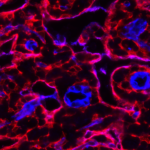Lien vers Pubmed [PMID] – 29293094
J. Clin. Invest. 2018 01;128(1):54-63
The ability to repair tissues is essential for the survival of organisms. In chronic settings, the failure of the repair process to terminate results in overproduction of collagen, a pathology known as fibrosis, which compromises organ recovery and impairs function. The origin of the collagen-overproducing cell has been debated for years. Here we review recent insights gained from the use of lineage tracing approaches in several organs. The resulting evidence points toward specific subsets of tissue-resident mesenchymal cells, mainly localized in a perivascular position, as the major source for collagen-producing cells after injury. We discuss these findings in view of the functional heterogeneity of mesenchymal cells of the perivascular niche, which have essential vascular, immune, and regenerative functions that need to be preserved for efficient repair.
